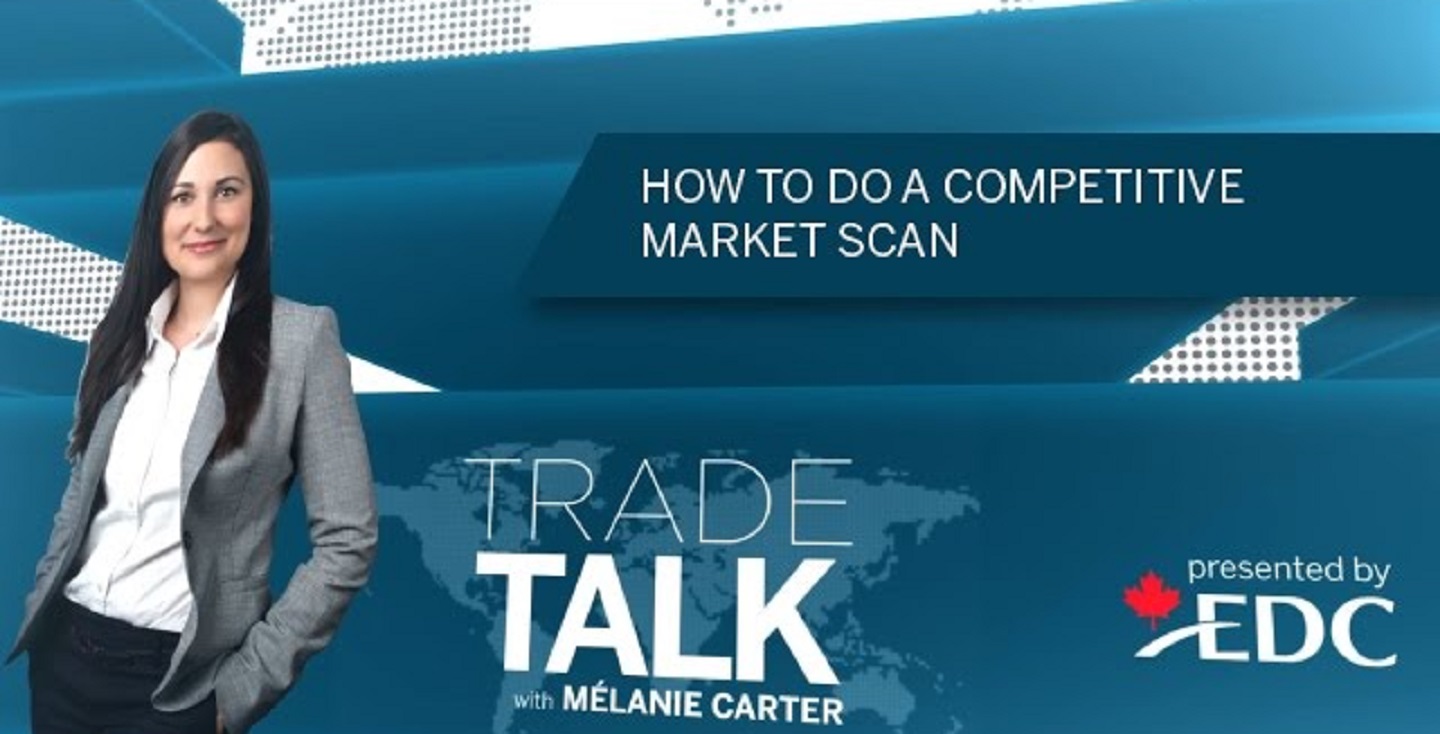Competitive advantage: Defining your unique selling proposition for new markets
A Unique Sales Proposition is a summary of what makes your company different and sets you apart from the competition.

MyEDC account
Manage your finance and insurance services. Get access to export tools and expert insights.
Solutions
By product
By product
By product
By product
Insurance
Get short-term coverage for occasional exports
Maintain ongoing coverage for active exporters

Learn how credit insurance safeguards your business and opens doors to new markets.

See how portfolio credit insurance helped this Canadian innovator expand.
Guarantees
Increase borrowing power for exports
Free up cash tied to contracts
Protect profits from exchange risk
Unlock more working capital

Find out how access to working capital fueled their expansion.
Loans
Secure a loan for global expansion
Get financing for international customers
Access funding for capital-intensive projects

Find out how direct lending helped this snack brand go global.

Learn how a Canadian tech firm turns sustainability into global opportunity.
Investments
Get equity capital for strategic growth

Explore how GoBolt built a greener logistics network across borders.
By industry
Featured

See how Canadian cleantech firms are advancing global sustainability goals.

Build relationships with global buyers to help grow your international business.
Resources
Popular topics
Explore strategies to enter new markets
Understand trade tariffs and how to manage their impact
Learn ways to protect your business from uncertainty
Build stronger supply chains for reliable operation
Access tools and insights for agri-food exporters
Find market intelligence for mining and metals exporters
Get insights to drive sustainable innovation
Explore resources for infrastructure growth
Export stage
Discover practical tools for first-time exporters
Unlock strategies to manage risk and boost growth
Leverage insights and connections to scale worldwide

Learn how pricing strategies help you enter new markets, manage risk and attract customers.

Get expert insights and the latest economic trends to help guide your export strategy.
Trade intelligence
Track trade trends in Indo-Pacific
Uncover European market opportunities
Access insights on U.S. trade
Browse countries and markets
Get expert analysis on markets and trends
Discover stories shaping global trade
See what’s ahead for the world economy
Monitor shifting global market risks
Read exporters’ perspectives on global trade
Knowledge centre
Get answers to your export questions
Research foreign companies before doing business
Find trusted freight forwarders
Gain export skills with online courses
Discover resources for smarter exporting
Get insights and practical advice from leading experts
Listen to global trade stories
Learn how exporters are thriving worldwide
Explore export challenges and EDC solutions
About
Discover our story
See how we help exporters
Explore the companies we serve
Learn about our commitment to ESG
Understand our governance framework
See the results of our commitments
MyEDC account
Manage your finance and insurance services. Get access to export tools and expert insights.
A Unique Sales Proposition is a summary of what makes your company different and sets you apart from the competition.
Build an Export Plan Part 1 of 3 in series

This blog by trade expert Todd Winterhalt and video podcast is the 1st in a 3-part series on how to create a winning selling proposition for your company.
In this blog post:

If you are considering selling to new markets, you’ve probably had success selling in Canada. While there is plenty of opportunity abroad, the reality is that international markets can be a harder nut to crack.
To sell in the global market, you need a unique selling proposition (USP) to stand out and send a strong clear message.
Essentially, a USP is a summary of what makes your business unique and valuable to your target market. It answers a basic question that all customers ask — how can your company provide more value than your competitors?
To make inroads outside of Canada, you’ll have to overcome some combination of:
Experts agree that creating an effective USP is vital for any Canadian exporter. Identifying and ultimately marketing your company’s unique value proposition is essential to winning over potential customers in the U.S. and internationally.
The last point is important, and even more so if you are selling through an intermediate such as an agent or distributor. You want them to be grounded in detail and armed with as much strategic insight as possible.
Expressing a USP starts with understanding your business, and those of your key competitors in any markets you are entering.
Ask yourself:
You may need to conduct or review research to refine your answers.
You can learn a lot from what your competitors are doing. Conducting a market scan can be a valuable exercise. It can help you identify the right tone to use in your marketing efforts, and you may find that your value proposition or promotional material needs to be restated for the U.S. or international markets.
With this understanding, you can sit down to craft your USP. Here’s one high-level template you can follow:
Once you have identified your value proposition, you can use it to clearly and consistently communicate on a number of fronts. You can catch the attention of your target customers, create effective marketing materials, train staff and intermediaries, and answer customer inquiries — all important elements in carving out success in new markets.
There are a number of important factors that make Canada’s oil and gas sector unique:
Canadians often have access to services such as those of EDC or the Trade Commissioners Service that can connect them with in-market representatives who will help them position themselves in that particular market. Take advantage of those opportunities to connect.
When it comes to pricing, Canadian companies may not be as competitive as some others so it’s a good idea to position the product to offset the price. This is particularly important in the Middle East and India.
Positioning your company to emphasize all of the above pluses will put you in a good position to garner interest overseas.

Part 2 of 3 in series
Part 3 of 3 in series
How to create and use a powerful unique sales proposition
Canada’s new Indo-Pacific Agriculture and Agri-Food Office serves up more opportunities for exporters.

Learn how an Asian food importer grew in Latin America through EDC support and private labels.

Discover how market diversification can enhance your export strategy and provide new ways for your business to grow in today’s uncertain trade climate.

After accessing EDC Portfolio Credit Insurance, the environmental company saw sales grow by 60% and now exports to every continent

Learn how Wuxly Movement CEO, James Yurichuk, goes through a day leading the animal-free parka company.